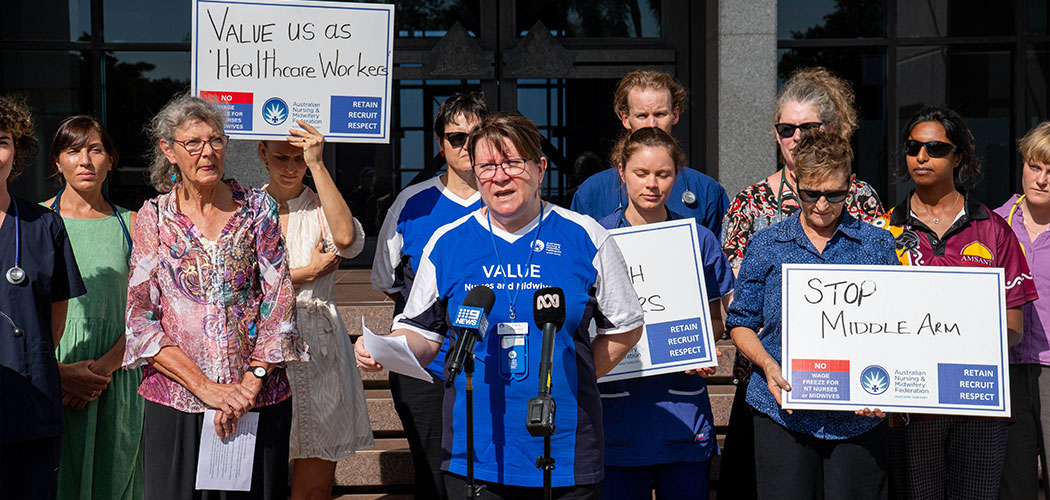In April, Northern Territory (NT) nurses and midwives, flanked by healthcare colleagues, stood on the steps of NT Parliament to voice their opposition to the contentious Middle Arm Industrial Precinct and its potential health and climate impacts.
A Senate Inquiry is currently scrutinising the development, particularly the federal government’s $1.5 billion funding commitment, and most importantly, the associated health and climate impacts that extraction of natural gas and oil through fracking in the Beetaloo Basin, and subsequent processing at Middle Arm’s proposed petrochemical hub, could trigger.
In its submission, the ANMF NT Branch highlighted “extreme concerns” regarding health and climate consequences.
“In the short term, we know that the particulate matter and noxious chemicals emitted from the proposed Middle Arm will cause increased respiratory illness and cancers in those living within a 5km radius from the plant,” the submission stated.
“Being just 2.5km from Palmerston, the population there will be subject to an unacceptably high risk of hospitalisation in an already over-burdened system.
“This year alone, there have been seven episodes over 53 days during which the Royal Darwin Hospital was under a “code yellow”, an emergency response due to insufficient staffing and no beds and needing to meet these demands. These are patently unsafe working conditions for all staff, that exacerbates our staffing shortages as people burn out and choose to work elsewhere, or in another profession.”
ANMF (NT Branch) Secretary Cath Hatcher, giving evidence at the Inquiry, argued the likelihood of increased health issues caused by the Middle Arm project would have a disproportionate impact on First Nations peoples, who make up 31% of the NT’s population and occupy 80% of its health system with chronic issues like renal disease and rheumatic heart disease.
“Why are they going to use the Darwin-Palmerston region as a guinea pig, because that’s what we are going to be,” Ms Hatcher told Senators.
“The air quality is already poor. If it’s going to get worse people aren’t going to stay.”
Louise Brown, a recently retired nurse with decades of experience working across Darwin and the Top End, echoes the ANMF’s call to stop the precinct from going ahead.
In her submission to the Inquiry, Louise questioned the ethical motivations behind both tiers of government partnering with the gas industry and, effectively, exposing the community to toxic outputs that will inevitably see a surge in the rates of premature births, childhood and adult cancers, and respiratory, cardiac, and other chronic diseases – “How is that fair, ethical or condoned by our governments?” she said.
“I feel very strongly that the plans that the government has to expand the gas industry will be catastrophic for the climate and health of our community,” Louise told the ANMJ.
“As a nurse, you go into nursing because it’s a caring profession, and we have a duty to protect and care for our clients. This [advocacy] is an expansion of that – it doesn’t stop just because you retire. I feel a very strong obligation to my community. I’m a mother and a grandmother and I want my family and everyone’s family to have a good, healthy life.”
Joining the chorus of concern, emergency and flight nurse Olivia Conan-Davies urged the Inquiry to consider the added strain on the health system from increased air pollution and illnesses.
“The Territory’s healthcare system is not coping with this burden of disease,” she said.
“People are waiting unacceptably long in Emergency waiting rooms and staff are burning out under the constant pressure. I believe this is because as nurses we are being put in the uncomfortable position of being unable to provide adequate healthcare to our increasing and critically unwell patient load.”
With the health system already “busting at the seams”, Ms Hatcher said it was important for the ANMF (NT Branch) to take a stand.
“I felt privileged to be able to be up there with my nursing and medical colleagues [giving evidence], sharing the concerns of the nursing and midwifery workforce. It’s already under strain and it will only get worse if a petrochemical hub is built.”
The Branch remains staunchly opposed to the development and is calling on the government to redirect $1.5 billion in taxpayer funds to more pressing local issues like healthcare, education, and housing.
“The evidence is clear, building this facility in Middle Arm is the wrong decision for the people of the Greater Palmerston/Darwin Region of the NT,” the Branch’s submission declared.
“If you lived in the Palmerston/Darwin region of the NT, would you put yourself and your family, at risk? So why would you do this to us?”
As the Senate Inquiry nears its conclusion, with a final report due on 13 August, the ANMF (NT Branch) plans to continue fighting the project by raising awareness of its potential public health risks.
Ms Hatcher admits that had you asked her 20 years ago if the ANMF should be political on issues such as Middle Arm, she’d have, matter-of-factly, said no. As times have changed, engaging in politics has become imperative to advance the nursing and midwifery professions and improve community health and wellbeing, she says.
“I think you’re on the back foot if you’re not up there and in that political space. You’re really not doing the whole federation, particularly in the territory, and all of the other states across Australia, justice.”








